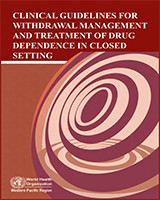From: 4, Withdrawal Management

All rights reserved.
Publications of the World Health Organization can be obtained from WHO Press, World Health Organization, 20 Avenue Appia, 1211 Geneva 27, Switzerland (tel: +41 22 791 2476; fax: +41 22 791 4857; e-mail: tni.ohw@sredrokoob). Requests for permission to reproduce WHO publications, in part or in whole, or to translate them – whether for sale or for noncommercial distribution – should be addressed to WHO Press, at the above address (fax: +41 22 791 4806; e-mail: tni.ohw@snoissimrep). For WHO Western Pacific Regional Publications, request for permission to reproduce should be addressed to Publications Office, World Health Organization, Regional Office for the Western Pacific, P.O. Box 2932, 1000, Manila, Philippines, fax: +632 521 1036, e-mail: tni.ohw.orpw@snoitacilbup
NCBI Bookshelf. A service of the National Library of Medicine, National Institutes of Health.